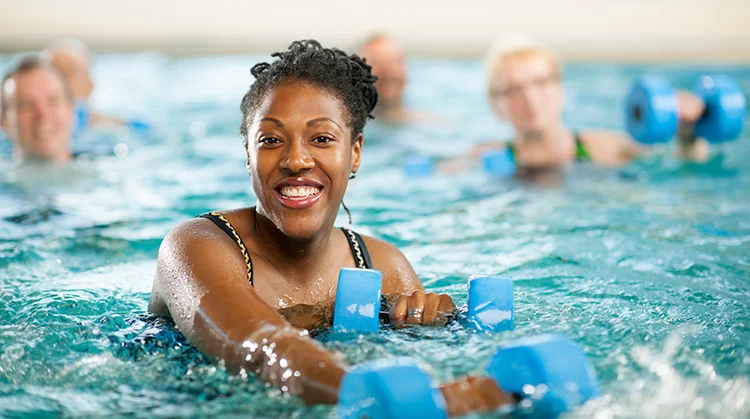Swimming is a versatile and accessible form of exercise that offers a multitude of benefits for people of all ages and fitness levels. Whether you’re a beginner or an experienced swimmer, there are plenty of reasons to incorporate swimming into your fitness routine. So, what exactly are the benefits of swimming that make it such a perfect exercise option? In this blog post, we will share the 15 hidden benefits of swimming, from its positive impact on mental health to its ability to aid in weight loss.

Contents
15 Benefits of Swimming for Exercise
When it comes to exercise, swimming is a fantastic option that offers numerous benefits for your physical and mental health. Let’s take a look at the 15 incredible benefits of swimming for exercise:
- Low-impact workout: Swimming is a low-impact sport that puts minimal stress on your joints, making it suitable for individuals with joint issues or injuries.
- Full-body workout: By engaging all major muscle groups, swimming provides a complete workout, helping you tone and strengthen your muscles.
- Cardiovascular fitness: Swimming is an excellent aerobic exercise that gets your heart pumping, improving your cardiovascular endurance and overall fitness.
- Burns calories: Swimming is an effective calorie-burning activity that can help you maintain a healthy weight or aid in weight loss efforts.
- Increased flexibility: The rhythmic movements and stretches involved in swimming can enhance your flexibility and range of motion.
- Improved respiratory function: Regular swimming can help improve lung capacity and breathing control, benefiting individuals with asthma or other respiratory conditions.
- Boosts metabolism: Swimming can rev up your metabolism, contributing to improved energy levels and a faster calorie burn even outside the pool.

- Enhanced posture: Swimming helps strengthen your core muscles, leading to better posture and spinal alignment.
- Joint pain relief: Swimming can provide relief from joint pain and stiffness, particularly for individuals with conditions like osteoarthritis.
- Reduced risk of chronic diseases: Regular swimming has been linked to a reduced risk of chronic health conditions such as heart disease, stroke, and type 2 diabetes.
- Stress relief: Swimming allows you to disconnect from everyday stressors, promoting relaxation and mental well-being.
- Improved sleep: Swimming has been shown to improve the quality of your sleep, promoting deeper rest and better recovery.
- Increased coordination: The combination of different strokes and movements in swimming can enhance your coordination and motor skills.
- Social engagement: Joining a swimming club or participating in group classes can provide a social outlet and support system, boosting motivation and enjoyment.
- Suitable for all ages: Swimming is a sport that can be enjoyed by people of all ages and fitness levels, making it a lifelong activity that you can continue well into your golden years.
Who is swimming best suited to?
Here’s a breakdown of who swimming is best suited to:
1. Individuals with Joint Issues or Injuries:
Due to its low-impact nature, swimming is an excellent choice for those with joint issues or injuries. The buoyancy of water reduces stress on the joints, making it a safe and effective option for rehabilitation or as a long-term exercise solution.
2. People Looking for a Full-Body Workout:
Swimming engages all major muscle groups, providing a comprehensive full-body workout. It helps tone and strengthen muscles while improving endurance, flexibility, and overall fitness. Whether you’re looking to sculpt your arms, strengthen your core, or tone your legs, swimming covers it all.
3. Individuals Seeking Cardiovascular Fitness:
Regular swimming sessions can significantly improve cardiovascular health. It gets your heart pumping, increases lung capacity, and improves circulation. By challenging your cardiovascular system, swimming helps build endurance and stamina.
4. Those Looking to Manage or Lose Weight:
Swimming is an excellent exercise for weight management. It burns a significant amount of calories while offering a low-impact workout. Engaging in regular swimming sessions can contribute to weight loss and help maintain a healthy weight.
5. People Wanting to Improve Breathing Control:
Swimming requires rhythmic breathing, which helps improve lung capacity and control. By practicing proper breathing techniques in the water, you can enhance your overall respiratory function and increase your ability to control your breath in various situations.
6. Individuals Seeking Mental Health Benefits:
Swimming not only benefits physical health but also has positive effects on mental well-being. It offers a sense of relaxation, reduces stress, and improves mood. The combination of water, movement, and focus can have a calming and meditative effect on the mind.
How do I start swimming in a safe way?
Here are some tips to help you get started and make the most out of your swimming workouts while minimizing the risk of injury.

1. Start Slow and Gradually Increase Intensity:
If it has been a while since your last swimming workout, it’s crucial to start slow and allow your body to adjust. Begin with two or three swim workouts per week and gradually increase the time, distance, or intensity as you become more comfortable in the water and build cardiovascular stamina.
2. Get the Right Gear:
To fully enjoy your swimming workouts and ensure optimal performance, invest in quality gear. A well-made swimsuit that you feel comfortable in is essential. Additionally, a good pair of adjustable goggles will protect your eyes and enhance visibility while swimming. If you have long hair, consider using a swim cap to reduce drag and make your movements through the water more efficient.
3. Find a Safe Swimming Location:
Finding a safe place to swim is crucial, especially for beginners. Look for a pool with designated lanes and lifeguards on duty. Pools provide a controlled environment that allows you to focus on your workout while ensuring your safety.
4. Consult with Your Healthcare Provider:
Before starting a swimming routine, it’s important to consult with your healthcare provider, especially if you have any underlying medical conditions or injuries. They can evaluate your medical history and fitness level to provide guidance on appropriate swimming exercises for you. This step will help ensure your safety and maximize the benefits of swimming as a form of exercise.
Frequently Asked Questions
Will I lose weight swimming 30 minutes a day?
On average, you can burn around 250 calories in a 30-minute swimming session. Backstroke helps to tone various parts of the body, including the stomach, legs, arms, and shoulders.
Why do I feel tired after swimming?
Even when swimming hard, after a length of time in a cold pool, your core temperature will be slightly lowered. In addition, your body is expending more energy to maintain that temperature, which leads to greater fatigue than normal.

Hello, I’m Ravindra. Over the years, I’ve immersed myself deeply into the world of fitness and health, transforming both my body and mind. Writing has allowed me to share my journey, insights, and expertise with those just starting out and seasoned fitness enthusiasts alike. Beyond just routines and diets, I believe in inspiring others to adopt a holistic approach to well-being.
